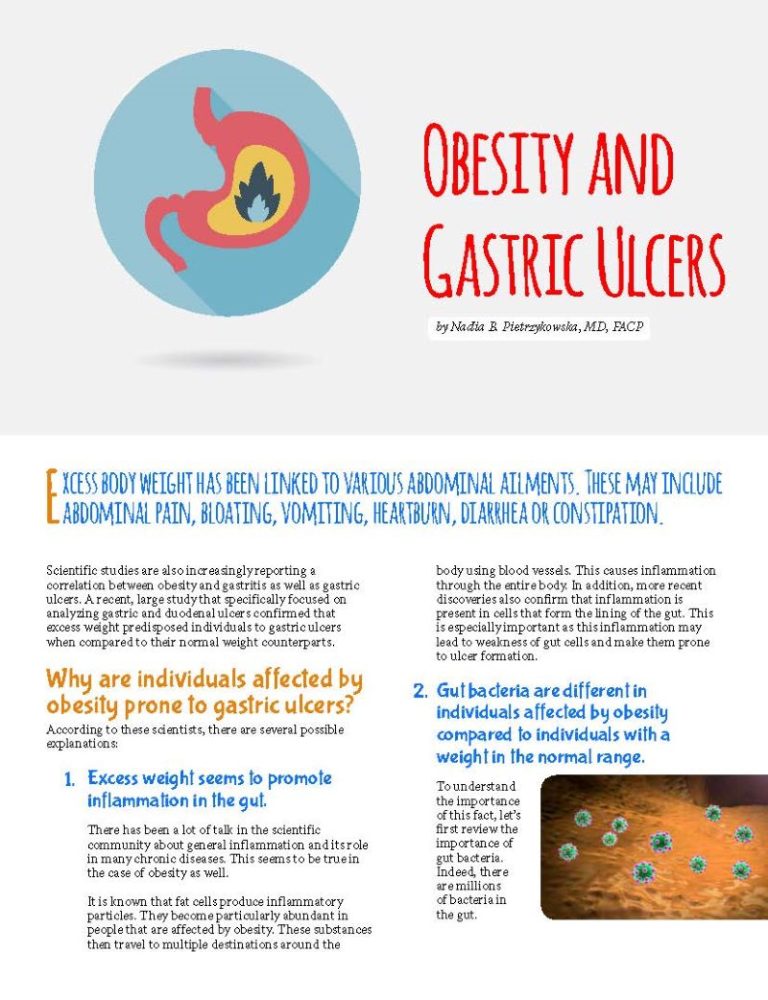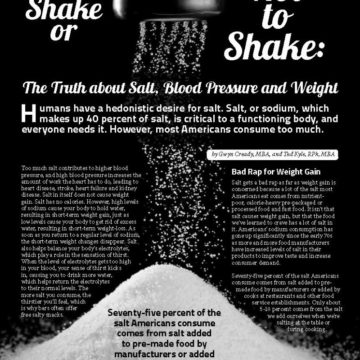Obesity and Gastric Ulcers


by Nadia B. Pietrzykowska, MD, FACP
Fall 2014
Excess body weight has been linked to various abdominal ailments. These may include abdominal pain, bloating, vomiting, heartburn, diarrhea or constipation.
Scientific studies are also increasingly reporting a correlation between obesity and gastritis as well as gastric ulcers. A recent, large study that specifically focused on analyzing gastric and duodenal ulcers confirmed that excess weight predisposed individuals to gastric ulcers when compared to their normal-weight counterparts.
Why are individuals affected by obesity-prone to gastric ulcers?
According to these scientists, there are several possible explanations:
1. Excess weight seems to promote inflammation in the gut.
There has been a lot of talk in the scientific community about general inflammation and its role in many chronic diseases. This seems to be true in the case of obesity as well.
It is known that fat cells produce inflammatory particles. They become particularly abundant in people that are affected by obesity. These substances then travel to multiple destinations around the body using blood vessels. This causes inflammation through the entire body. In addition, more recent discoveries also confirm that inflammation is present in cells that form the lining of the gut. This is especially important as this inflammation may lead to weakness of gut cells and make them prone to ulcer formation.
2. Gut bacteria are different in individuals affected by obesity compared to individuals with a weight in the normal range.
To understand the importance of this fact, let’s first review the importance of gut bacteria. Indeed, there are millions of bacteria in the gut.
These normal gut “residents” are very important to maintain a healthy gut. They have many jobs. For instance, they not only play a significant role in the digestion as well as absorption of nutrients, but also protect gut cells and keep them healthy.
This said, it was found that individuals with excess weight tend to have gut bacteria that are different from normal weight individuals. This difference seems to create a weaker “gut army” and makes gut cells more susceptible to inflammation and ulcers.
3. The lining of the gut appears to be leakier in individuals affected by excess weight and obesity.
What it means is that, in addition to the processes that were described previously in this article, some studies showed that the normal spaces and connections that exist between gut cells tend to get disrupted. This can possibly facilitate the entry of harmful toxins, irritants, bacteria and other pathogens into the gut lining. Such events may also induce ulcers.
Now that we know that excess weight and obesity make individuals more susceptible to ulcers, how would you know that you have a stomach ulcer?
There are several symptoms that you should be looking for if you think you may have a stomach ulcer:
- The most common one is burning pain that can be felt anywhere from your breastbone to your navel. This pain is caused by stomach acid getting in contact with the ulcer. It might be worse when your stomach is empty and during the night. Certain foods may help decrease the pain just like antacids sold at the drugstore can as well.
- Some people may also experience bloating, nausea and vomiting.
- More alarming symptoms may include vomiting blood that can be red or black like coffee grounds. This may be life threatening and should prompt an immediate trip to the hospital. Noticing black stools is also very serious and requires immediate medical attention. Sometimes, changes in appetite or some degree of weight-loss can be noticed as well.
If you have any of these symptoms, you should promptly seek medical attention. Ulcers that are not treated can have various consequences, from simply being a nuisance to putting individuals at risk for life threatening complications.
How are ulcers treated?
For milder symptoms, your doctor may first ask you to take an acid-blocking medication. In other cases, you might be referred to a gastroenterologist (physician specializing in gut diseases). Sometimes, an endoscopy may be recommended. It involves inserting a small, lighted tube (endoscope) through the throat and into the stomach. This is done to confirm the presence of ulcers and to take biopsies. This procedure is usually done if you are having severe symptoms. This also helps the physician determine whether bacteria called Helicobacter Pylori caused the ulcer. If these bacteria are identified, you will be asked to take a course of antibiotics in addition to any acid-blocking medications.
If you are diagnosed with ulcers, you will also be asked to avoid medications called NSAIDS, like aspirin, ibuprofen or naproxen for example. Some NSAIDS like aspirin come in a “coated” form that breaks down further down in the gut and is much less damaging to the stomach than regular aspirin tablets. You should always inform your doctor about any prescribed or over-the-counter medications that you take.
What else can you do to avoid ulcers?
As we discussed at the beginning of this article, excess weight and obesity seem to be linked to a significantly higher chance of having ulcers. This can happen regardless of whether the typical causes of ulcers are identified, like the presence of Helicobacter Pylori in the gut or excessive use of NSAIDS.
Besides the usual recommendations and prescriptions to treat ulcers, weight-loss needs to be emphasized. Talk to your doctor about your weight and seek advice on how to manage it.
Many body systems and organs are affected by obesity. If you have excess weight and are prone to gastric ulcers, this becomes an additional reason to seek professional help with weight-loss. This may help you treat and prevent many obesity-related diseases and their complications, including gastric ulcers.
About the Author:
Nadia B. Pietrzykowska, MD, FACP, is a Board Certified and Fellowship trained Obesity Medicine and Physician Nutrition Specialist. She is the Founder and Medical Director of “Weight & Life MD,” a Center dedicated to Medical Weight Management, Nutrition, Fitness and Lifestyle located in New Jersey.
by Kendall Griffey, OAC Communications Manager Spring 2024 We have officially kicked off Your Weight Matters Regional…
Read Articleby Sarah Ro, MD; and Young Whang, MD, PhD Fall 2023 Mary, a postmenopausal woman with a…
Read Articleby Rachel Engelhart, RD; Kelly Donahue, PhD; and Renu Mansukhani, MD Summer 2023 Welcome to the first…
Read Article








